CAMERA
OBSCURA

a play by
Lorenzo DeStefano
based
on The Inman Diary by
Arthur Crew Inman
published by Harvard University Press
synopsis of the play
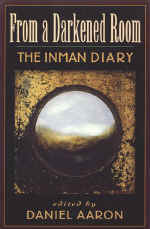
 "INMAN" is inspired by the gargantuan diary of that highly eccentric son-of-the-South, ARTHUR CREW INMAN (1895-1963). Atlanta-born and
Boston-bred, Inman created the longest diary ever written by an American, a sprawling memory piece of over 17 million words poured into 155 handwritten
volumes. One of the great literary curiosities of our age, this
tightly-wound epic of the mind covers the entire 68 years of Inman's life and a
good deal of human history in between.
"INMAN" is inspired by the gargantuan diary of that highly eccentric son-of-the-South, ARTHUR CREW INMAN (1895-1963). Atlanta-born and
Boston-bred, Inman created the longest diary ever written by an American, a sprawling memory piece of over 17 million words poured into 155 handwritten
volumes. One of the great literary curiosities of our age, this
tightly-wound epic of the mind covers the entire 68 years of Inman's life and a
good deal of human history in between.
Holed up in
GARRISON HALL, the turn of the century Back Bay hotel where he's rented multiple
rooms since 1919, Arthur Inman chronicles the flow of history through his
fractured but highly intuitive lens. Insulated from the real world by a
long-running sideshow of housekeepers and nurses and handymen who meet his every
need, he fills his long hours in the intricately woven pages of his diary world.
He places ads in the Boston papers for paid "talkers" and
"readers".
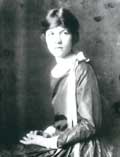 If
sufficiently young, engaging and female they are invited by Arthur's wife of
forty years, EVELYN YATES INMAN, to spend the night in Arthur's once-grand
bedroom. Lingering occasionally in the shadow of her husband's doorway, Evelyn
assumes a major role as their oddly tender and complex forty-year marriage
ritual plays itself out. Spanning nearly seven decades, the Diary
chronicles the life movements of literally hundreds of anonymous tradesmen and
secretaries, students and charlatans who come to sit in the dark with "Mr.
Inman". Their everyday lives become a fascinating and integral part
of Arthur's rapidly expanding diary. Set primarily in Boston in December
of 1963, "INMAN" covers the entire span of Arthur's diary in a single
day, what turns out to be the final 24 hours of his long unquiet life. Arthur's
obsession with capturing these final fleeting moments drives the play's narrative. If
sufficiently young, engaging and female they are invited by Arthur's wife of
forty years, EVELYN YATES INMAN, to spend the night in Arthur's once-grand
bedroom. Lingering occasionally in the shadow of her husband's doorway, Evelyn
assumes a major role as their oddly tender and complex forty-year marriage
ritual plays itself out. Spanning nearly seven decades, the Diary
chronicles the life movements of literally hundreds of anonymous tradesmen and
secretaries, students and charlatans who come to sit in the dark with "Mr.
Inman". Their everyday lives become a fascinating and integral part
of Arthur's rapidly expanding diary. Set primarily in Boston in December
of 1963, "INMAN" covers the entire span of Arthur's diary in a single
day, what turns out to be the final 24 hours of his long unquiet life. Arthur's
obsession with capturing these final fleeting moments drives the play's narrative.
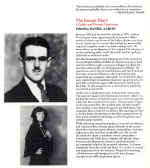 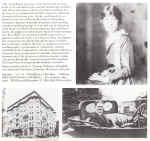 Highly attuned to his own strengths and numerous shortcomings, he explores with
painful honesty his own view of world history, his weakness for young girls, his
corrosive hatred of his long-dead parents and the perilous terrain of his
marriage to Evelyn. A world-class hypochondriac, Arthur's unending medical complaints (from photophobia [the fear of light] to chronic
osteopathic disasters) comprise a major theme in the play, as does his love/hate
addiction to the legions of doctors who descend on him over the years. He
reserves his special admiration and scorn for the noted osteopath DR. CYRUS
RUMFORD PIKE, his wife's openly ardent lover.
Highly attuned to his own strengths and numerous shortcomings, he explores with
painful honesty his own view of world history, his weakness for young girls, his
corrosive hatred of his long-dead parents and the perilous terrain of his
marriage to Evelyn. A world-class hypochondriac, Arthur's unending medical complaints (from photophobia [the fear of light] to chronic
osteopathic disasters) comprise a major theme in the play, as does his love/hate
addiction to the legions of doctors who descend on him over the years. He
reserves his special admiration and scorn for the noted osteopath DR. CYRUS
RUMFORD PIKE, his wife's openly ardent lover.
Scanning back and forth through time, Arthur navigates the hazardous terrain of
his diary with an increasing level of anxiety. Long dead people in his life,
great and small, come alive again in the confines of the apartment he's barely
left in fifty years. The tension and dread brought on by his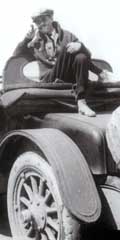 swelling memories and virtuoso self-loathing conspires with the very real
turmoil going on outside Arthur's windows to drive him completely over the edge.
swelling memories and virtuoso self-loathing conspires with the very real
turmoil going on outside Arthur's windows to drive him completely over the edge.
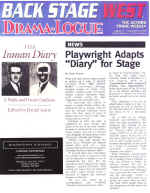
An oddly sympathetic creature despite his often harsh and controversial views,
Arthur Inman is a man at the end of his moral rope. His world has become a
curious admixture of KRAPP'S LAST TAPE and ALL IN THE FAMILY. His early
dreams of poetic immortality seem dubious at best.
By December 5, 1963 Garrison Hall has become a fortress against the ravages of
time and urban renewal. Arthur is more terrified than ever of leaving his room,
relates to life via television and the hours of audio recordings he's become
obsessed with making.
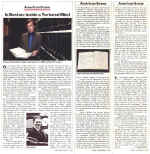 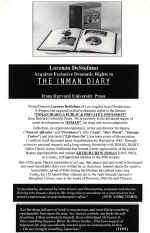 In the end, his diary is the only compass he possesses to navigate within this twilight zone of his own making. Haunted by the scourge of the ever-rising
PRUDENTIAL CENTER directly across the street, the threat of nuclear oblivion,
his own folly, this highly compelling and oddly sympathetic creature sinks ever deeper into the parallel universe of his diary
while the modern world explodes around him.
In the end, his diary is the only compass he possesses to navigate within this twilight zone of his own making. Haunted by the scourge of the ever-rising
PRUDENTIAL CENTER directly across the street, the threat of nuclear oblivion,
his own folly, this highly compelling and oddly sympathetic creature sinks ever deeper into the parallel universe of his diary
while the modern world explodes around him.
|









